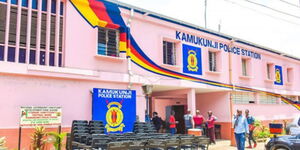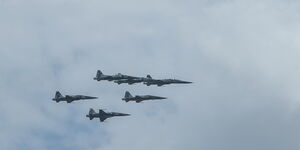The President of the Republic of Kenya, who is also the Head of State and Government and the Commander-in-Chief, is the main custodian of the country's intelligence (politically speaking).
On a daily basis, he receives intelligence briefs from all the security apparatus and agencies. The reports are filed by what is known as the Presidential Daily Brief (PDB) team which provides him with a daily summary of high-level, all-source information and analysis on national security issues sourced locally and internationally.
As the Head of State, William Ruto receives intel every morning, with insiders detailing that the meetings are held between 6 am and 6:30 am.
Kenya’s PDB secret agents, both within the country and overseas, compile the classified information overnight and package it in confidential and encrypted formats to prevent unauthorized access.
Members of the unit are drawn from all security agencies in the country, most notably the National Intelligence Service (NIS), the Directorate of Criminal Investigations (DCI), and the Military Intelligence from the Kenya Defence Forces (KDF).
Officers from the Military Intelligence and the NIS head the team that compiles the report that is presented to Ruto on a daily basis, whether he is in Kenya or abroad.
The report is presented to Ruto in listicle format, with the crucial intel given the topmost priority. However, the team briefs the President on all the reports gathered and advise him on the top five that require immediate action.
Ruto can be necessitated to convene the National Security Council (NSC) at a short notice, to deliberate on key issues. Section 240 of the Constitution dictates the formation of NSC which consists of the President, his Deputy President, Cabinet Secretaries for Defence and Internal Security, the Attorney General, the Chief of Kenya Defence Forces, the Director General of the National Intelligence Service and the Inspector General of the National Police Service.
“The Council shall exercise supervisory control over national security organs and perform any other functions prescribed by national legislation. The President shall preside at meetings of the Council where it integrates the domestic, foreign and military policies relating to national security in order to enable the national security organs to co-operate and function effectively.
“It also assesses and appraises the objectives, commitments and risks to the Republic in respect of actual and potential national security capabilities,” the Constitution directs.
NSC presents an annual report to Parliament on the state of security in Kenya and may, with the approval of Parliament, deploy national forces outside Kenya for regional or international peace support operations and approve the deployment of foreign forces in Kenya.
Among the dossiers presented to ex-President Uhuru Kenyatta by NSC include integrity cases labelled against six judges the President rejected to appoint, postponing Mt Kenya tours in 2019, the crisis in the Agriculture docket that saw the Head of State sack former CS, Mwangi Kiunjuri, the National Youth Service scandals, and the popularity of the Building Bridges Initiative (BBI).
The NIS is currently involved in managing almost all facets of running the government, from gathering political intelligence, economic intelligence, counter-intelligence, political security and law enforcement.
Loopholes in intelligence reports forced former president Uhuru Kenyatta to restructure NIS in 2014 after a spate of attacks in Lamu, Nairobi and Mombasa.
Sources privy to the changes detailed that Uhuru had grown tired of receiving intelligence briefs and was also concerned about simmering wrangles between KDF and NIS.
Former NIS boss, Michael Gichangi, was reportedly forced into early retirement after he was blamed for lapses in gathering and sharing intelligence to curb the influx of attacks. His successor and Uhuru’s close ally Maj. Gen. (Rtd.) Philip Kameru took over and immediately worked on image repair and restoring Uhuru’s confidence.
The NIS and KDF are shielded from all public and private scrutiny including financial audits.
Getting Ready: Sharing Intel and Preparing Ops
NIS coordinates Kenya’s security efforts through various mechanisms. One of these is done through a Joint Operations Centre at Jogoo House, the National Police headquarters.
“NIS comes with information, but they don’t tell us how they got the information. They share content in a coded language like ‘around 7 people will come pretending to be guests at a hotel, we believe they are the militia."
“Often this information suggests it was gained through communications surveillance – it contains phone numbers or detailed statements of individuals’ communication patterns,” a police officer told Privacy International, a UK-based registered charity that defends and promotes the right to privacy across the world, in an interview dated 2017.
“Despite the crucial role of NIS in providing operational intelligence to law enforcement units, agents working for other branches largely report that they are not aware of exactly what the NIS do and how they gather their information. “NIS? …In all the years I have worked, I have even interacted with them but I really don’t know their capabilities…” recalls a forensics expert familiar with the police, according to Privacy International.
NIS is believed to operate almost entirely opaque even to the senior agents of other security organs with whom the NIS is mandated to work. The other security organs are reportedly, at times, kept out of the loop on key intelligence shared.












